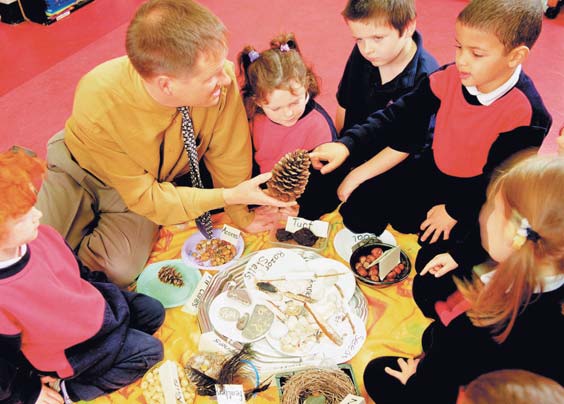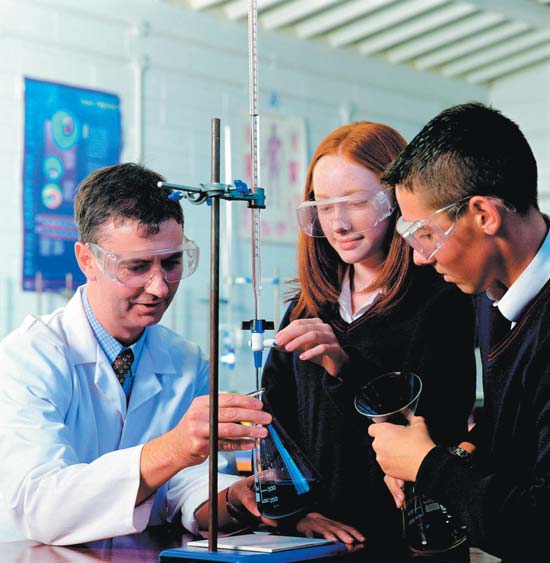| 2005 |

|
YEAR BOOK |
Department of Education and Science
|
Science Education
|
Introduction
Learning about science is a very important part of the education our children receive today. Along with contributing to their general education, a basic understanding of science is important to equip them to participate fully in modern Irish society. Fostering in them an attitude of enquiry and curiosity, and an interest in and an appreciation of both nature and technology, enhances the lives of our children. The ability to think logically and to apply rational thought processes to finding solutions to life's many and varied problems is a valuable learning outcome of time spent studying science in school. Studying science also opens the way to a world of interesting and fulfilling careers.

Science in our schools
There has been a shift in emphasis, in science education, from content to skills and process. This is strongly reflected in exciting new curricula at both primary and post-primary level. In primary schools, learning to think scientifically and to use scientific skills in problem solving are underpinned by an activity-based curriculum. In second-level schools, the Junior Certificate science syllabus promotes an investigative and "hands-on" approach to student practical work. The "hands-on" approach is again emphasised in Leaving Certificate Biology, Chemistry and Physics, where the application of science and technology to everyday life and to society in general is also explored.
The Transition Year option, currently provided by approximately 70% of second-level schools, facilitates a more innovative exploration of the sciences. Imagination and curiosity are stimulated by topics such as Astronomy, Sports Science and Horticulture in a variety of school-developed modules. Students participate in interesting and challenging activities, for example, visiting Ecology Fieldwork Centres or science-based enterprises. Experts visit the students, in the classroom, to challenge and inspire them. These modules broaden the students' experience of science and also act as "tasters" for Leaving Certificate subjects.
Following a decline over a number of years, recent evidence suggests a recovery in interest in the physical sciences. Provisional figures for 2004/05 indicate participation rates at Leaving Certificate level of 15.6% for Chemistry and 16.7% for Physics, up from lows of 11.3% and 15.3%, respectively, in 1998/99. Irish students are performing commendably in international fora, scoring significantly higher than the OECD average in the 2003 Programme for International Student Assessment (PISA) study, and coming 13th out of 29 OECD countries in science (http://www.erc.ie/pisa/). The winners of the EsatBT Young Scientist and Technology Exhibition, now the largest event of its kind in Europe, have competed with distinction in the European Union Contest for Young Scientists, sharing first prize on nine occasions in recent years.
Support services
Professional development of teachers continues to be a priority for the Department of Education and Science (DES). The Junior Certificate Science Support Service is still in the intensive phase of its work and is holding two further rounds of in-service seminars in the current school year. Following three years of intensive support, the National Biology Support Service has moved into a second year of work at local and regional level, organising a number of field days, workshops and seminars. The four years of intensive support provided by the Physical Sciences Initiative have been followed up by the Second Level Support Service, now in its third year of providing support through specific modular courses for Chemistry and Physics teachers and by facilitating setting up and maintaining networks of teachers.

The Inspectorate
The Inspectorate of the DES plays a key role in the development, implementation and review of educational policies and programmes in the sciences. The Inspectorate operates an inspection and evaluation programme in schools and places of education. The primary purpose of inspection is evaluation and hence identification and affirmation of good practice. Building on a firm foundation of positive findings, recommendations for improvement can then be made.
At post-primary level, the number of inspections has increased substantially, with over 160 science inspections carried out since 2001. Currently, there are ten science inspectors active in schools � four in Biology, three in Chemistry and three in Physics � six of whom were recruited in the last two years.
Initial findings from inspectors on the teaching of the sciences are encouraging. There are indications of more practical work being carried out, as required by syllabi, and quality curriculum planning is more evident. However, more emphasis is needed on longer-term planning for the development of subject areas in schools. Consolidating improvements and implementing recommendations will enhance the sciences in schools and further the scientific education of our children.
Contact: Dr Carl � D�laigh, Deputy Chief Inspector,
Department of Education and Science,
Marlborough Street, Dublin 1;
Web: www.education.ie